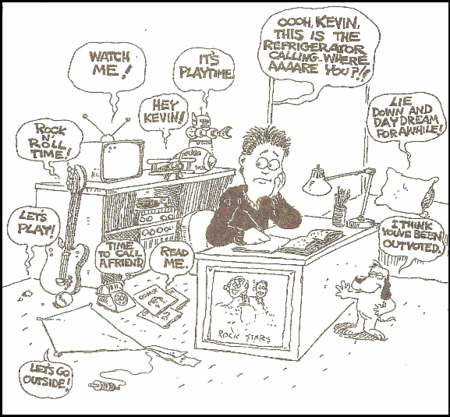It's important to have an organized space where you can consistently complete your homework and studying. Having fewer distractions and knowing where to find necessary materials will help you to complete your work more quickly, and allow you to have time to do the things you want to do! Taking a few minutes to read through these simple tips might just put you on the path to a shorter and more efficient homework time!
I'm going to try to keep this post streamlined and organized, just like a study space should be...
Workspace
- Have a set study space and storage space.
- The storage space should ideally be in the study space, but it could also be a shelf or cabinet or bin in another room.
- Keep your materials and textbooks in the same place all the time, when at home. Ideally, this place should be a specific location within your study space.
- If you split your time between two homes, or don't always have an opportunity to do your homework in the same place each day, create a "workspace bag/bin" that contains everything you'll need for a mobile workspace.
- The bag or bin will keep everything together, and is easily portable.
- Only take things out of the bag or bin when you're using them in that moment. Then, put the item back right away so you'll know where to find it when you need it next.
- Keep this workspace bag/bin in one place (e.g. trunk of a car).
 |
| This is not so good... |
- Reduce clutter in your work area.
- You should work on a clear, uncluttered surface.
- After unpacking your bag, put one subject's materials on the surface at a time. Leave the other materials off the work surface, so you have reduced the "visual noise."
- Adjust furniture to fit your needs.
- Sit in a comfortable chair (with armrests, if you're working at a computer), that allows you to maintain good posture: sitting up straight with your feet flat on the floor or on a footrest.
- When you're working on the computer, your eyes should be about 1.5 feet from the screen (about arms' length)
- The keyboard should be centered and on a stable surface
- The monitor should be about 5cm above eye level.
- Zoom in on what you're looking at or working on, and adjust the settings so messages aren't popping up and you're not receiving notifications irrelevant to your task.
Routines
- Unpack everything from your backpack and file away old materials at a routine time.
- File old papers and tests. Don't throw away materials or past assessments unless your teacher says to; these materials may come in handy when you're preparing for mid-year or final exams.
- Use accordion folders, separate binders, or a giant binder with dividers to keep old work organized by subject and topic. Put these in your storage space so they're not cluttering up your work space, but they're still available for reference when needed.
- You could do this every day, at the end of every school week, or even on Sundays when you're preparing for another week at school. It doesn't really matter when; the important thing is that you do this at least 1-2 times per month, depending on how many papers you have in your binders or folders.
| I'm pretty sure you don't want your work area to end up looking like this. |
- Set aside time at the beginning of each work session to review your planner and to check (using the classroom websites, if possible), that you know what you have to accomplish that night.
- Then, make a plan of approach: What will you start with? What will you do next? When, and for how long, will you take a break? Plan this out in writing, and stick to it.
Environment
- Reduce and/or remove distractors in your work area.
- Put your phone in a different room
- Keep the computer screen turned off unless you're using it for homework
- Pull down the shades/ blinds if you're facing a window
- Turn off the TV or music
 |
| Look familiar? It does to me! |
- Make sure you have adequate lighting, so your eyes don't have to work as hard.
- Get some fresh air in the room if possible.

